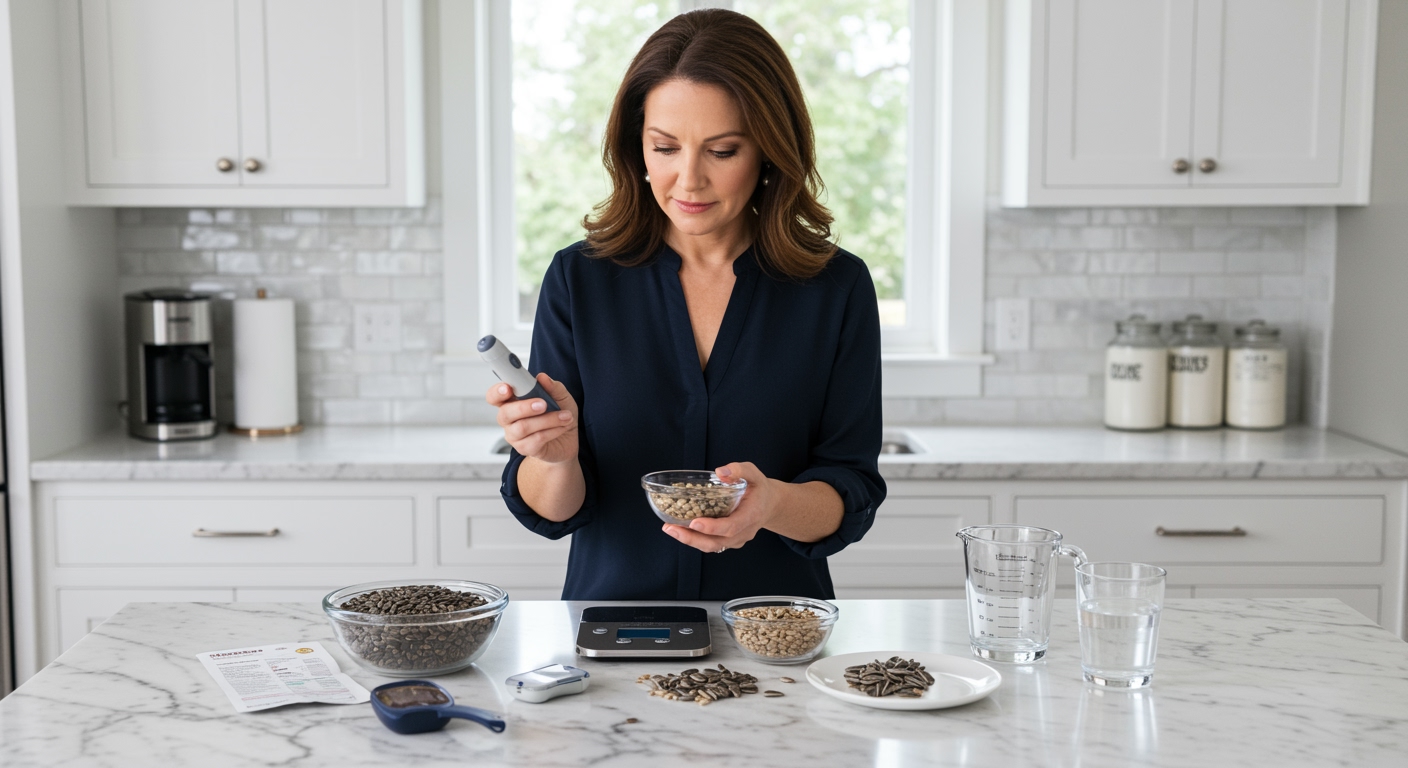✪ Key Takeaway: Sunflower seeds are generally safe for diabetes due to their low glycemic index and beneficial nutrients that may help improve blood sugar control.
Introduction
You reach for a handful of sunflower seeds as a snack, then suddenly wonder if this choice will send your blood sugar soaring.
Many people with diabetes face this exact dilemma every day when choosing snacks that seem healthy but might secretly sabotage their glucose control.
Hi, I’m Abdur, your nutrition coach, and today I’m going to explain exactly how sunflower seeds affect blood sugar and whether they deserve a place in your diabetes-friendly diet.
What Makes Sunflower Seeds Different From Other Snacks?
Sunflower seeds pack a unique nutritional profile that sets them apart from typical snack foods.
A one-ounce serving contains about 6 grams of carbohydrates, but here’s where it gets interesting for diabetes management.
These seeds deliver 3 grams of fiber and 6 grams of protein in that same serving, creating a powerful combination that slows glucose absorption.
The healthy fats in sunflower seeds make up about 14 grams per ounce, primarily unsaturated fats that support heart health.
This macronutrient balance creates a natural buffer against rapid blood sugar spikes that you might experience with processed snacks.
The glycemic index of sunflower seeds sits at approximately 35, placing them firmly in the low-glycemic category that diabetes experts recommend.
✪ Fact: Foods with a glycemic index below 55 are considered low-glycemic and cause minimal blood sugar spikes.
How Do Sunflower Seeds Affect Blood Sugar Levels?
Research shows that sunflower seeds may actually help improve blood sugar control rather than worsen it.
A study published in the Journal of Chemical and Pharmaceutical Research found that consuming sunflower seeds helped reduce fasting blood glucose levels in people with type 2 diabetes.
The mechanism behind this benefit involves the seeds’ high magnesium content, which plays a crucial role in glucose metabolism.
Magnesium helps your cells respond better to insulin, the hormone responsible for moving glucose from your bloodstream into your cells for energy.
The fiber content in sunflower seeds slows down the digestion process, preventing the rapid glucose release that causes blood sugar spikes.
Additionally, the protein and healthy fats work together to create a steady, sustained energy release that keeps your blood sugar stable for hours.
✪ Pro Tip: Eat sunflower seeds with the shell removed to avoid excess sodium that often comes with flavored varieties.
What About Portion Control And Timing?
Even healthy foods can cause problems when you eat too much, and sunflower seeds are no exception.
A proper serving size equals about one ounce or roughly a small handful, which contains approximately 160 calories.
Eating more than this amount can add up quickly in calories and may contribute to weight gain, which complicates diabetes management.
The best time to enjoy sunflower seeds is between meals as a snack or paired with other foods to create a balanced meal.
Adding sunflower seeds to salads, yogurt, or oatmeal can help slow the absorption of carbohydrates from these foods.
Avoid eating sunflower seeds late at night when your metabolism naturally slows down and glucose clearance becomes less efficient.
Monitor your individual response by checking your blood sugar 1-2 hours after eating sunflower seeds to understand how your body specifically reacts to them.
✪ Note: Individual blood sugar responses can vary, so personal monitoring remains the gold standard for food choices.
Are There Any Risks Or Concerns?
While sunflower seeds offer many benefits for diabetes management, certain considerations deserve your attention.
Commercial sunflower seeds often come loaded with excess sodium, which can raise blood pressure and increase cardiovascular risk.
People with diabetes already face higher risks of heart disease, making sodium control even more critical for overall health.
Choose unsalted varieties whenever possible, or rinse salted seeds before eating to remove some surface sodium.
The high calorie density of sunflower seeds means that mindless snacking can quickly add unwanted pounds.
Some people may experience digestive discomfort when eating large amounts due to the high fiber content, especially if their usual diet lacks adequate fiber.
Start with smaller portions and gradually increase your intake to allow your digestive system to adapt to the increased fiber load.
✪ Pro Tip: Pre-portion sunflower seeds into small containers to avoid overeating and maintain consistent blood sugar control.
The Bottom Line
Sunflower seeds can be an excellent addition to a diabetes-friendly diet when consumed in appropriate portions and chosen wisely.
Smart food choices are not about perfection, but about making consistently better decisions that support your long-term health goals.
I would love to hear about your experience with sunflower seeds and blood sugar management, so please share your thoughts, questions, or personal insights in the comments below.
References
At NutritionCrown, we use quality and credible sources to ensure our content is accurate and trustworthy. Below are the sources referenced in creating this article:
- PMC: Nutritional and Health Benefits of Sunflower Seeds
- Glycemic Index Net: Sunflower Seeds Glycemic Index
- Herbazest: Sunflower Seeds May Improve Blood Sugar Control in Diabetics
- Journal of Chemical and Pharmaceutical Research: Effects of Sunflower Seeds on Fasting Blood Glucose in Diabetes Mellitus Type 2 Patients





